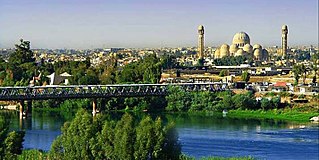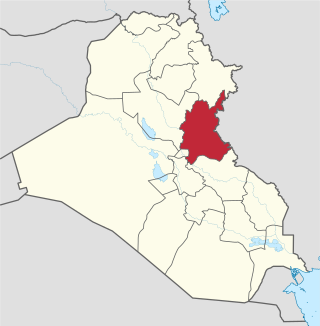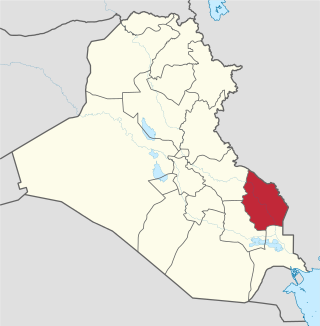Related Research Articles

Baghdad is the capital of Iraq and the second-largest city in the Arab world after Cairo. It is located on the Tigris near the ruins of the ancient city of Babylon. In 762 CE, Baghdad was chosen as the capital of the Abbasid Caliphate, and became its most notable major development project. Within a short time, the city evolved into a significant cultural, commercial, and intellectual center of the Muslim world. This, in addition to housing several key academic institutions, including the House of Wisdom, as well as a multiethnic and multi-religious environment, garnered it a worldwide reputation as the "Center of Learning".
Iraq is a federal parliamentary representative democratic republic. It is a multi-party system whereby the executive power is exercised by the Prime Minister of the Council of Ministers as the head of government, the President of Iraq as the head of state, and legislative power is vested in the Council of Representatives.

Basra Governorate, also called Basra Province, is a governorate in southern Iraq in the region of Arabian Peninsula, bordering Kuwait to the south and Iran to the east. The capital is the city of Basra, located in the Basrah district. Other districts of Basra include Al-Qurna, Al-Zubair, Al-Midaina, Shatt Al-Arab, Abu Al-Khaseeb and Al-Faw located on the Persian Gulf. It is the only governorate with a coastline.

Nineveh Governorate, also known as Ninawa Governorate, is a governorate in northern Iraq. It has an area of 37,323 km2 (14,410 sq mi) and an estimated population of 2,453,000 people as of 2003. Its largest city and provincial capital is Mosul, which lies across the Tigris river from the ruins of ancient Nineveh. Before 1976, it was called Mosul Province and included the present-day Dohuk Governorate. The second largest city is Tal Afar, which has an almost exclusively Turkmen population.

The occupation of Iraq was characterized by a large United States military deployment on Iraqi territory, beginning with the US-led invasion of the country in March 2003 which overthrew the Ba'ath Party government of Saddam Hussein and ending with the departure of US troops from the country in 2011. Troops for the occupation came primarily from the United States, the United Kingdom, and Australia, but 29 other nations also provided troops, and there were varying levels of assistance from Japan and other countries, as well as tens of thousands of private military company personnel.

Diyala Governorate or Diyala Province is a governorate in northeastern Iraq.

Baqir Jabr Al-Zubeidi, also known as Bayan Jabr Solagh, is a former commander of the Badr Brigades who served as the Finance Minister of Iraq in the government of Nouri al-Maliki. He served as Minister of Interior, in charge of the police, in the Iraqi Transitional Government and was Minister of Housing and Reconstruction of the Iraqi Governing Council. He is a senior member of the Shi'a United Iraqi Alliance as well as a leader in the Supreme Council for the Islamic Revolution in Iraq (SCIRI).

Maysan Governorate is a governorate in southeastern Iraq, bordering Iran. Its administrative centre is the city of Amarah, and it is composed of six districts. Before 1976, it was named Amara Province.

Al Anbar Governorate, or Anbar Province, is the largest governorate in Iraq by area. Encompassing much of the country's western territory, it shares borders with Syria, Jordan, and Saudi Arabia. The population is mostly Sunni Muslims. The provincial capital is Ramadi; other important cities include Fallujah and Al-Qa'im.

Parliamentary elections were held in Iraq on 30 January 2005 to elect the new National Assembly, alongside governorate elections and a parliamentary election in Kurdistan Region. The 275-member legislature had been created under the Transitional Law during the international occupation. The newly elected body was given a mandate to write a new constitution and exercise legislative functions until the new constitution came into effect. The elections also led to the formation of the Iraqi Transitional Government.
Ali al-Haidari was the governor of the Baghdad Governorate in Iraq. Al-Haidari had narrowly escaped being killed in an assassination attempt in early September 2004 in Baghdad, but he was assassinated by gunmen during a second attempt in Baghdad in early 2005. A group led by Abu Musab al-Zarqawi claimed responsibility, and six suspects were arrested in November 2005.

Dr. Alaa (Ala') Al-Tamimi was mayor of Baghdad in 2004 and 2005.

Governorate council elections were held in Iraq on 30 January 2005, the same day as the elections for the transitional Iraqi National Assembly. Each province has a 41-member council, except for Baghdad, whose council has 51 members.

Mithal Jamal Hussein Ahmad al-Alusi is an Iraqi politician and the leader of the Iraqi Ummah Party. He was elected to the Iraqi Council of Representatives as an independent in the December 2005 election and was once again elected in the 2014 Iraqi parliamentary election as part of the Civil Democratic Alliance which is an Iraqi political coalition formed by various liberal and civil figures and his party one seat, represented by himself. He arrived fifth place in Baghdad out of seventy-one seats. He is a Sunni Muslim Arab politician and supports a close alliance with the United States of America, the United Kingdom, Turkey and Israel.

Governorate or provincial elections were held in Iraq on 31 January 2009, to replace the local councils in fourteen of the eighteen governorates of Iraq that were elected in the 2005 Iraqi governorate elections. 14,431 candidates, including 3,912 women, contested 440 seats. The candidates came from over 400 parties, 75% of which were newly formed.

Qasem Soleimani was an Iranian military officer who served in the Islamic Revolutionary Guard Corps (IRGC). From 1998 until his assassination in 2020, he was the commander of the Quds Force, an IRGC division primarily responsible for extraterritorial and clandestine military operations. In his later years, he was considered by some analysts to be the right-hand man of the Supreme Leader of Iran, Ali Khamenei, as well as the second-most powerful person in Iran behind him.

Kasim Muhammad Taqi al-Sahlani was an Iraqi politician. He was a member of the National Assembly of Iraq and was the head of the parliamentary bloc of the Islamic Dawa Party - Iraq Organisation, the fifth largest party within the ruling United Iraqi Alliance coalition. Further, he was a member of the National Assembly's Foreign Affairs Committee.
The Baghdad governorate election of 2009 was held on 31 January 2009 alongside elections for all other governorates outside Iraqi Kurdistan and Kirkuk.
Ali Aswad al-Jiburi, better known by his nom de guerre as Abu Ayman al-Iraqi, was an ISIL commander and Shura council member killed on 18 May 2016 by an airstrike in northern Iraq.
References
- 1 2 Another side of the surge (Part 3), Steve Bisbee, published in the University of Pittsburgh's Pitt Political Review, 2008, retrieved 15 March 2009
